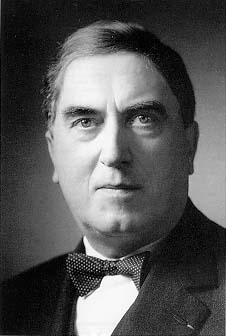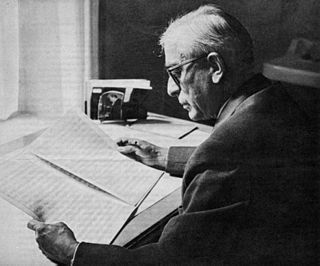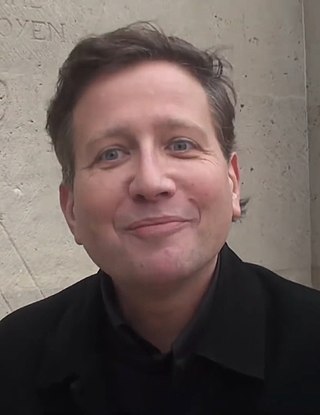Related Research Articles

Maurice Gustave Duruflé was a French composer, organist, musicologist, and teacher.
Julian Anderson is a British composer and teacher of composition.

Frederik Reesen Magle is a Danish composer, concert organist, and pianist. He writes contemporary classical music as well as fusion of classical music and other genres. His compositions include orchestral works, cantatas, chamber music, and solo works, including several compositions commissioned by the Danish Royal Family. Magle has gained a reputation as an organ virtuoso, and as a composer and performing artist who does not refrain from venturing into more experimental projects – often with improvisation – bordering jazz, electronica, and other non-classical genres.

Péter Eötvös is a Hungarian composer, conductor and teacher.
David John Briggs is an English organist and composer.

Jean Victor Arthur Guillou was a French composer, organist, pianist, and pedagogue. Titular Organist at Saint Eustache in Paris, from 1963 to 2015, he was widely known as a composer of instrumental and vocal music focused on the organ, as an improviser, and as an adviser to organ builders. For several decades he held regular master classes in Zurich and in Paris.
Egil Hovland was a Norwegian composer.

Rolande Roberte Ginabat-Falcinelli was a French organist, pianist, composer, and music educator.

Pieter William Kee was a Dutch organist and composer.

Conrad Arthur Beck was a Swiss composer.

François Daniel Roth is a French organist, composer, musicologist, and pedagogue. He was titular organist from 1985 until 2023 at the church of Saint-Sulpice in France's capital, Paris, alongside Sophie-Véronique Cauchefer-Choplin, and as of February 2023, will remain as emeritus titular organist.
Volker David Kirchner was a German composer and violist. After studies of violin and composition at the Peter Cornelius Conservatory, the Hochschule für Musik Köln and the Hochschule für Musik Detmold, he worked for decades as a violist in the Radio-Sinfonie-Orchester Frankfurt. He was simultaneously the violist in the Kehr Trio founded by his violin teacher Günter Kehr, and a composer of incidental music at the Hessisches Staatstheater Wiesbaden.
Harald Feller is a German organist, choral conductor and composer teaching at the Hochschule für Musik und Theater München. He was awarded the 1983 Grand Prix du Disque Liszt.
Jeremy Thurlow is an English composer, known for his chamber music, orchestral scores, vocal music setting English and French poetry as well as experimental texts, and music for dance and stage and is performed across the UK and in France, Spain, Italy, Germany, Sweden, Romania, Japan, Korea and the USA. His music has been performed by BBC Philharmonic Orchestra, The Scottish Chamber Orchestra, Matthew Schellhorn, the Fitzwilliam String Quartet, the Aronowitz Ensemble, the Kreutzer Quartet, Rolf Hind, The Schubert Ensemble, Sequitur, the Alinea Quartett, Endymion, the Ligeti Quartet, Alec Frank-Gemmill, The Hermes Experiment, Krysia Osostowicz, The Echea Quartet, The Norrbottens Kammarorkester, Peter Sheppard Skaerved, Symphonova, the Choir of St John's College, Cambridge, Trinity College Choir, the Dr K Sextet and the BBC Singers.

Thierry Joseph-Louis Escaich is a French organist and composer.
Theo Brandmüller was a German composer of Contemporary Music, organist and university teacher.

Stéphane Blet was a French classical pianist and composer.

Alain Henri Bernaud was a French composer.

The Prélude, usually affixed with the subtitle pour orgue, is an organ piece in E major by French composer Olivier Messiaen. The work, which dates from the 1920s, is, along with the Offrande au Saint Sacrement, the earliest surviving organ work of the composer. Scholars differ as to the exact date and purpose as to when and why it was composed.
References
- ↑ Hakim, Naji. "Biography in Arabic".
- ↑ Hakim, Naji. "Twitter Account".
- ↑ Hakim, Naji. "Saul de Tarse (oratorio)".
- ↑ Hanhivaara, Elina (November 2001). "Music – with love / Musiikkia – rakkaudella". Naji Hakim.
- ↑ "Interview with Naji Hakim".
- ↑ Pipedreams. "Naji Hakim of Paris".
- 1 2 Hernandez 2005, p. 1.
- 1 2 Kim, Sung Hee (May 2015). Te Deum by Naji Hakim: historical background and structural analysis (PDF) (DMA). Indiana University Jacobs School of Music. Retrieved 13 August 2020.
- 1 2 3 4 Benford, Alexander Elliott (2018). Popular Idioms in Select Organ Works of Naji Hakim, Jon Laukvik, and Wolf-Günter Leidel (PDF) (DMA). University of Alabama. Retrieved 13 August 2020.
- 1 2 3 Lee, Hye-Young (2006). Tracing Messiaen in Naji Hakim's Le Tombeau d'Olivier Messiaen (PDF) (DMA). University of North Texas. Retrieved 13 August 2020.
- 1 2 3 4 "Naji Hakim". Schott Music (in German). Retrieved 13 August 2020.
- ↑ Rink, Ludwig. "An den Orgeln von Paris". Deutschlandfunk.
- ↑ Wohlberg, Tara (20 March 2003). "Organist specializes in improvisation". The Vancouver Sun . Vancouver. p. 68. Retrieved 13 August 2020– via Newspapers.com.
- ↑ "Naji Hakim". United Music Publishing. Retrieved 13 August 2020.
- 1 2 Aeolus. "Naji Hakim". aeolus-music.com. Retrieved 13 August 2020.
- ↑ "Eröffnungskonzert mit Naji Hakim". Augsburger Allgemeine (in German). Augsburg. 17 September 2007. Retrieved 13 August 2020.
- ↑ "Pange lingua (1996)". United Music Publishers. 2003. Archived from the original on 19 November 2009. Retrieved 29 July 2010.
- ↑ Javadova, Jamila (October 2007). "Invocation of Joy, Glory and Greatness" (PDF). The American Organist . Retrieved 13 August 2020.
- ↑ "Wie schön leuchtet der Morgenstern". Schott Music.
- ↑ A 500 Year Organ Journey – Organ and Orchestra Music from Baroque to Modern – Programme Notes, p14, Muscat Royal: Opera House Muscat, 24 Feb 2019
Sources
- Hernandez, Heather (2005). "An Analysis of the Influence of Improvisation on Selected Chant-Based Organ Works of Naji Hakim". Etd Collection for University of Nebraska - Lincoln. D.M.A. Diss., University of Nebraska at Lincoln: 1–162.